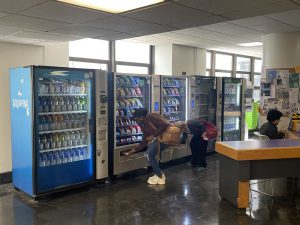Standing in front of a vending machine, Hunter students are greeted by unhealthy, sugar filled, high calorie options like flavored sodas, gatorades, chips, and candy bars. Many students are unaware that the reason behind this abundance of sugary beverages and junk food on campus is due to a contract signed years before they even matriculated here at Hunter.

The aptly named Pouring Rights Contract was signed in 2013, and tied the City University of New York (CUNY) into its first 10-year commitment with a beverage company, PepsiCo, and its products in exchange for a hefty $21 million. However, the large sum came with a big catch: CUNYs could only sell PepsiCo products in their vending machines and cafes across campus.
When the deal was signed, the sum was agreed to be distributed amongst all of the 24 CUNY campuses, with some set aside for athletic events and sustainability initiatives. However, there is little to no public comments on this contract, and CUNY has not responded to multiple requests made by different student organizations on how the money was spent.
Now, with the contract coming to an end in 2023, one group across CUNY has made it their mission to fight the renewal of this contract, and demands that student’s input and health are taken into account.
The CUNY Campaign for Healthy Food, otherwise known as CHeF, launched its Pouring Rights Campaign earlier this year, alongside an alternative proposal that calls for more water fountains, less canned and bottled beverages, and healthier options in vending machines. Based at the CUNY Urban Food Policy Institute, CHeF’s mission revolves around fighting food insecurity with innovative policies and initiatives, primarily in schools.
Michelle Ma, Hunter’s Campus Organizer for the CHeF initiative and Hunter student, says that the high prevalence of vending machines on campus are a threat to students, specifically those of color and marginalized groups which make up predominately most of Hunter’s population. “There has been a history of predatory marketing from the food industry, like fast food and PepsiCo, that has historically targeted lower income and racial minority groups,” says Ma.
Currently, there are 22 active vending machines across Hunter’s West, East, and North buildings, with service unreliable and options either limited or blatantly missing. Lubov Shield, a junior here at Hunter, shared that she typically has to visit two different buildings when she’s looking to buy something from the vending machines. “Majority of the time, the vending machines aren’t stocked up, and if they are, the machines will probably eat your money,” said Shield, “Even worse, I never even like what I end up buying because it’s all so junky.”
Lack of access to healthy food is not the only concerning aspect of this contract– the massive deal only further worsens the amount of single use plastics on campus. In 2021, the amounts had gotten so high that NY State signed Legislation S.6815/A.7564 to force CUNYs and SUNYs to reduce the amount of single use plastic distributed on their campuses.
Hunter’s most updated 10-year Sustainability Plan was released in 2020, and claimed that the installation of water fountains across campus has helped eliminate 19 million water bottles from entering New York City’s recycling system. Yet, the report also states that only 30% of the waste and recycling goals from the previous (2008-2018) plan was achieved. The current amount of plastic waste produced by Hunter has not been published.
If CHeF is successful in preventing the renewal of the contract with PepsiCo, Ma says they hope that PepsiCo products can be phased out and replaced with multiple vendors that provide both diverse and affordable options that align with CUNY’s sustainability and health goals. CHeF hopes the future beverage environment at CUNY looks to offer healthier options, reduce plastic waste, and open CUNY up for business with more than just one beverage company. “It is important that more local vendors, especially those of color, are prioritized for business with Hunter and the rest of CUNY,” said Ma.
The Pouring Rights Contract renewal is set to take place in 2024. Students interested in speaking up against the renewal of this contract can fill out CHeF’s survey here and follow their Instagram.
